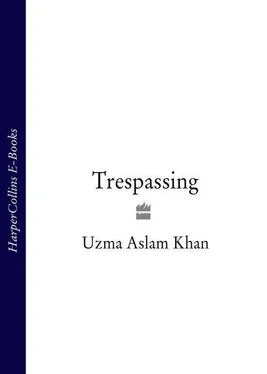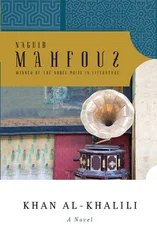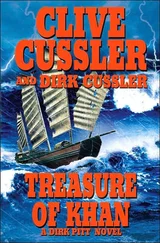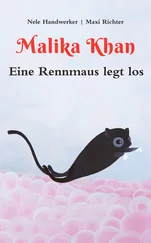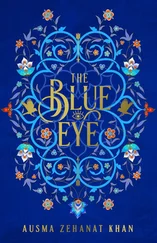The rocks were gashed in places by deep gullies that pitched dangerously. Salaamat carefully maneuvered the ridges, feeling deftly for notches, and even Fatah held his breath. But eventually, the slopes flattened closer to the angle of the riverbank. Salaamat hurried on, stepping at last into a leafy path. Then, all of a sudden, a few feet below, he spotted a small field of a flowering crop.
‘Well imagine this!’ Fatah halted. ‘There must be an underground spring nearby. Let’s go see.’ They jumped down the last incline and were level with the shore. Fatah turned into the field, tearing a handful of blossoms. ‘Smell. Sweet as honey!’ He slid the bouquet into Salaamat’s hand.
Salaamat took it sadly.
Fatah stopped, astonished. ‘I know where we are! This is the closest Mohana village to us. Who knew it could be accessed from here? Takes for ever by road. Look,’ he pointed to a row of orange trees. ‘I bet we can fill up on tangerine torture!’
There was a small thatched hut and in the distance, the kind of Mohana boathouse sometimes seen drifting down the river past their campsite: flat-bottomed with a high prow and a canopy of reeds. The boats were big, often with two or three families in residence. This one was about ten feet long — nothing resembling the smaller, canoe-shaped boats of his village. Fatah was right about the spring: an ox turned the wheels of a water pump.
Salaamat was wondering how they’d got the huge animal all the way here when Fatah gently tugged his sleeve. ‘Sit with me a while before we go any further. Here, in this beautiful bower.’ He pulled him into the shade of an orange tree, and reclined his head on Salaamat’s shoulder. He was the shorter one so when they lay with feet together, his hair brushed Salaamat’s ear. He kissed it loudly. The ear started ringing.
Fatah said, ‘If it weren’t for the Chief, I’d go to Sulawesi.’
Salaamat folded his arms. His Sulawesi was down there, with the Mohana fishermen.
‘You’re supposed to say, “What’s in Sulawesi?”‘When Salaamat still wouldn’t answer, he sang, ‘I’ve nursed you like the beat of my heart. I’ve snatched you from the hands of fate.’
‘I’m going across.’ Salaamat pulled away. He stood up and began walking.
Fatah followed. ‘All right. I’ll buy the drink if you stop being so foolish.’
Children were running along the bank, calling out to two women washing clothes in the river. They held strings in their hands, though Salaamat couldn’t see what was tied to the ends. Not kites, something much smaller. One woman looked up and saw him approach. She sent a child into the hut, probably to call the men. Salaamat now saw what the boy had on the end of his string: a dragonfly, beating violet wings as the child twirled the line around and around.
Salaamat was roused early in the tent he shared with five others. ‘Get up!’ A man shoved him with the barrel of his gun. ‘Time to go.’ He peered out from under a grimy sheet, grabbing the man’s arm with one hand, his pistol with the other. It was Gharyaal Bhai, and his watch showed just after three o’clock.
‘We have a long journey,’ the man grinned. He prodded him once more, gently this time. Salaamat stumbled out with him.
Fatah had already washed himself. Under the stars his mop of hair shone like a cannonball, dripping over a beaming face. He thumped Salaamat’s shoulder. ‘Ready for test number two, meri jaan?’
Salaamat dunked his head in the dark river. He shook it dry, spraying Fatah. ‘What’s the hurry? There’s going to be no one on the highway to rob at this hour.’
‘We don’t rob. We clean. And you’ll be surprised how many cars we’ll find, especially around Thatta.’
Salaamat stared at him. Fatah knew his family worked on a farm near there. Why had he planned it this way? ‘Why do we have to go that far south? It will take hours.’
Fatah smiled mysteriously. ‘We have hours. We might even make it back in time for a quick walk up the gorge, just you and me.’ He winked, walking away.
One minute Salaamat loved him, the next Fatah was everything he despised. Everything. Anger welled inside him as he joined the half a dozen others awake now too. He helped collect sticks for the fire, his mind racing. What was he, the wife in this marriage?
Gharyaal Bhai made the tea. The jeep hadn’t brought supplies yesterday. They were down to drinking hot water with only enough leaves and milk powder for color. There was no sugar. Rusks were in short supply. No one betted away cigarettes. The Commander said it was all part of the discipline. No one argued. He was the Chief’s brother-in-law.
But in private, the men said the Commander had hidden sugar packets under his tent, which was why he never allowed his to be assembled and disassembled during morning drill. They swore they’d seen him digging up sacks in the middle of the night, shoveling crystals down his throat like a lunatic.
Fatah took the first cup Gharyaal Bhai poured. The men let him. He was, Salaamat had only recently discovered, First Lieutenant Muhammad Shah’s brother-in-law. Salaamat scowled: if everyone around him was related to the Chief in some way, wasn’t he the outsider again?
The other men too were growing increasingly sullen. They were losing weight. Only a visit to the Chief’s lair or an expedition to the highway animated them. They seemed to be thinking of this while sipping the hot water daubed with token Lipton leaves. In silence, they prayed together for parathas, chat, halwa puri, fresh milk. When no miracle hand served them, they talked about Thatta. ‘We can always get rewri there,’ someone said, and the others cheered up.
From across the fire Fatah called out to him, ‘Oh Rani, the Chief said if you pass this test too all of us can get as many dishes of rewri as we want.’
A few men snickered. Though he didn’t like Fatah mocking him this way in public, Salaamat knew many of the others had paired up, some even in his tent. There was plenty of fire to throw around.
After the measly breakfast, they headed for the jeep. This time no one blindfolded him. He sat, as on the trip to the Chief’s, beside Fatah. The vehicle wove through dense thickets, sometimes paralleling the river, at others cutting perpendicular to it. A lank sunrise slowly crept around them, bringing the flutter of birds and the silence of crickets.
Gharyaal Bhai reached over and pinched Salaamat’s cheek. ‘You’d better pass because I’m getting very hungry.’ Conversation returned to food. Men exchanged notes on the best dessert ever made by their mothers. As excitement escalated, each man praised his own mother at the expense of another’s. Abuse flailed. Fatah, disgusted, growled, ‘Conserve your strength.’ He forbade anyone to speak of sweets till they were actually being eaten. A sullen silence descended again.
Further south, the level of the Indus began to drop. Fatah’s jaw muscles twitched. ‘They’ve stolen our Sindhu.’ The others nodded, urging him to continue. He did. ‘Once we called it the life of the lower valley. What valley? This is a desert. What life? We’re being buried alive.’ He recited the famous lines: ‘With homes on the river bank, those who die of thirst, die of their own making.’
There was consensual muttering, ‘… Of their own making.’
Salaamat watched his friend, feeling the performance was delivered partly to show him what a fine commander he’d make.
The jeep took a short cut through the dry riverbed, kicking up dust. It was June but the monsoons gave no hint of calling. The sun rode beside them, stealing up from the parched land, roasting everything in sight. To preserve his saliva, even Fatah talked less.
Читать дальше
Конец ознакомительного отрывка
Купить книгу
